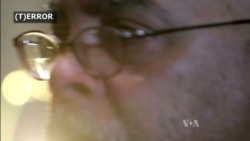An acclaimed new documentary, (T)error, was inspired by a coincidence. Filmmaker Lyric Cabral was a college student when she met Saeed Torres, a former black revolutionary who lived in the same building in New York City.
“He seemed trapped in time,” she said, recalling the scent of marijuana and 1970s music drifting from his apartment. As the two became friendly, he introduced her to jazz musician Tarik Shah.
One day in 2005, Torres disappeared, his apartment emptied. Not long after, Cabral got a phone call from Torres. He said he was an FBI informant and his apartment had been wired for audio and video surveillance. His target, Shah, had been arrested on terrorism charges.
Cabral didn’t know what to do with the information. “I was both repulsed and sort of attracted to the tremendous nature of the story,” she said.
Then she met David Sutcliffe, a filmmaker working in the same after-school arts program. “One of our students was arrested by the FBI, a 16-year-old Muslim girl, Adama Bah, accused of being a potential suicide-bomber. The accusation was completely unfounded and she was released,” Sutcliffe said.
Sutcliffe began making a film about Bah, and studying other counter-terrorism cases involving informants. “I thought it was incredibly problematic and also dramatically profound, the complications that must exist within these informants, the double-consciousness,” he said.
“And I happened to mention to Lyric that it would be great to make a film about an informant, but how are you ever going to find an informant, and how would you convince them to get in front of a camera and tell their story? And she said, ‘How odd that you say that, because I know an informant. And I know that he wants to tell his story.’”
The two filmmakers found that Torres would allow them to secretly film him – unbeknownst to the FBI - as he worked on what he planned to be his final job. (T)error, a kind of absurdist tragedy, is the result.
The target was a man named Khalifah al-Akili, a Muslim convert who ran a program for young Somalis in Pittsburgh, Pennsylvania. He had named the program “Al Shabab,” which in Arabic means “youth.”
“It’s also the name of a terrorist organization in Somalia, and I think it’s possible that’s what drew the FBI’s attention, in combination with his online statements,” said Sutcliffe. “He’s not someone who hides his opinions and his criticisms of the U.S. government.”
But al-Akili never advocated violence, according to Sutcliffe. “So it really is a question of constitutionally protected speech,” he said.
Within weeks, Torres’ overtures to befriend al-Akili misfired. Al-Akili became suspicious, and posted on his Facebook page that he was the target of an attempted FBI sting.
That gave the filmmakers an opening to approach al-Akili directly for interviews as well, without telling Torres – and still unbeknownst to the FBI. Sutcliffe was filming outside al-Akili’s apartment when agents arrived to arrest him.
It was the night before al-Akili was to appear at a news conference denouncing FBI entrapment in Muslim communities. Al-Akili was not arrested for terrorism, however, but on a gun charge, for visiting a shooting range.
Because he had previously been convicted of non-violent offenses, he was forbidden to be in possession of a firearm.
“In a lot of these counter-terrorism cases, [federal agents] try to find some lower violation to use in case the terrorism case does not pan out,” Sutcliffe said.
(T)error is shot almost surveillance style. “We wanted audiences to sort of feel the pressure, visually, of what it’s like to be under FBI surveillance,” Cabral said.
Facing 15 years in prison, al-Akili took a plea bargain deal for eight years. The filmmakers said the FBI refused interview requests. The agency declined to comment for VOA.
Now showing at a documentary festival in New York, (T)error will be broadcast on U.S. public television next year. The filmmakers also are showing it in Muslim communities, “to support a larger outreach campaign, and call for congressional oversight of these informants,” Sutcliffe said.
““Terrorism is a dire threat,” Cabral said. “I think our argument in this film is that the FBI should be trying actively to pursue these threats, not just sort of patrolling Muslim communities. Informants have ruined the fabric of the Muslim community, sowed seeds of distrust. We’re hoping the film will stimulate dialogue.”
In New Documentary '(T)error,' Two Filmmakers Surveil Surveillers
NEW YORK —





